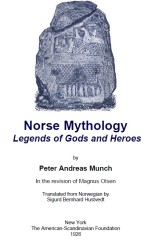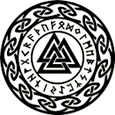
Author : Munch Peter Andreas
Title : Norse Mythology Legends of Gods and Heroes
Year : 1926
Link download : Munch_Peter_-_Norse_Mythology.zip
The mythology of our forefathers, as we know it from Norse mythical poems and from the records of ancient writers, has not come down to us in its genuine pagan form. It is extant only in a later form, dating from a period when its devotees had begun to lose their absolute faith in the older divinities, had begun to harbor doubts and to catch intimations of a consolation nobler and better than that which the ancient divinities had been able to give them. We learn to know it, furthermore, in the sources designated, as it manifested itself in Norway during the centuries just preceding the introduction of Christianity and as it appeared, something more than a hundred years earlier, upon its transference into Iceland by the Norwegian emigrants. In its main outlines it was at that time common to all the so-called Germanic tribes: on the one hand, to Norwegians, Swedes, and Danes; and on the other hand, to Goths, Franks, Saxons, Swabians, Frisians, Anglo-Saxons, and other peoples. Yet in the nature of the case, as the Germanic tribes gradually diverged with respect to language, customs, and modes of living, and each thus entered upon a separate development, it followed of necessity that mythology and cult took on a distinct character in each of these tribes; even in early prehistoric times, moreover, external influences proceeding from the more cultivated of neighboring non-Germanic peoples must have been at work, and also mutually operative influences as between the Germanic tribes themselves. The ancient Norse religion was thus far from being identical with the mythology and worship of the other Northern or Germanic peoples. Evidence to this effect is to be discovered even in a cursory comparison with the few available accounts of religious conditions among the various German tribes during the pagan era. The pagan beliefs of the Swedes and the Danes, of which little is known through direct tradition, must also have differed in many particulars from those prevailing in Norway and Iceland as paganism drew toward its end. According to the plan of the present work, the Norwegian-Icelandic myths will have the most prominent place; it is these which particularly concern us, and only by means of these is it possible to reconstruct anything like a complete mythology. So far as it is practicable, nevertheless, reference will be made to the religious survivals of the other Germanic peoples. Among the various Germanic tribes the pagan mythology was gradually driven back as Christianity spread abroad: first of all in France, about five centuries after the birth of Christ; thereafter in England, a century or two later; and still later in Germany, where the Saxons, who received the new faith at the hands of Charlemagne about the year 800, stood last of the pagan tribes. In the North paganism held its ground more stubbornly; in Iceland it did not loose its hold before the beginning of the eleventh century, in Norway and Denmark thirty years later, and in Sweden probably not before the year 1150. Farther to the south the ancient faith was so thoroughly uprooted that scarcely a reminiscence survived. Only a small number of the early writers have set down so much as an occasional comment on the pagan divinities; their references lack fullness and exactitude and bear the clear stamp of prejudice and contempt. In more southerly lands, even those occupied by German tribes, there existed no such deep need and desire for the preservation of ancestral traditions as marked the North; or, if these tendencies had once prevailed, they had been smothered by the growing influence of the Catholic clergy. Furthermore, such writers as took any interest in recording the memories of the past were almost without exception ecclesiastics, who held it sinful to mention the ancient gods more than was strictly necessary. The situation was different in the North; there the pagan faith maintained a firmer footing, the general interest in searching out old traditions and listening to tales of ancestral prowess had struck deeper roots, and, what is more important, the clergy had never gained so complete an ascendancy as in the South. The chief reason for these conditions, at any rate in Norway and Iceland, was that the people held fast both in writing and in speech to the mother tongue, so that Latin, the language of the church, never became well established. The Norse historian would have found little profit in using Latin after the manner of the southern clergy, since few would have been able to read what he might write. Historical composition thus came to be the province of the laity rather than of the clergy. Moreover, our forefathers were inordinately fond of skaldic poetry and song. The skalds made their verses in the vernacular; and since they drew most of their figures and similes from the old mythology, study of the myths was necessary both for the poets and for those who listened to their lays. The skald Hallfred, for example, upon his baptism made the unequivocal statement to king Olaf Tryggvason that he would neither deride the ancient gods nor refrain from naming them in his verse. Through these various means a knowledge of the older mythology was maintained in Norway and Iceland; and for a long time nothing more than a visit to the neighboring kingdom of Sweden was required to discover a land still wholly pagan. In Iceland the common interest in poetry and history remained so vigorous that, even after medieval Christianity had run a good part of its course, two comprehensive and otherwise remarkable source books of Norse mythology made their appearance, namely Snorri’s Edda and the so-called Sæmund’s Edda. Snorri’s Edda is a veritable handbook for skaldic poets, written about the year 1220 by the illustrious Snorri Sturluson; the first part of the work contains a full account of the ancient system of divinity, and in addition a number of separate stories about the gods and their deeds. The designation of Edda, which doubtless means “great-grandmother,” probably became attached to the book because its contents were drawn from ancient narratives and songs that had come down from the “days of great-grandmother” herself. Sæmund’s Edda is a collection of poems celebrating the gods and heroes of olden times. Just when the collection originated is uncertain; evidences tend to make it contemporaneous with Snorri’s Edda; yet the individual poems are much older and had lived long in popular tradition before they came to be written down. Sæmund’s Edda is also called the Elder Edda; Snorri’s, the Younger Edda.1 Further information about the primitive mythology is to be gathered from numerous early poems, still extant, and bits here and there from the saga narratives; but these sources are as nothing in comparison with the two Eddas. In fine, it is only through Norwegian-Icelandic sources, that satisfactory knowledge of the ancient mythology is to be obtained. ...

Tourney Phillip - What I saw that day
Authors : Tourney Phillip F. - Glenn Mark Title : What I saw that day Year : 2011 Link download :...














